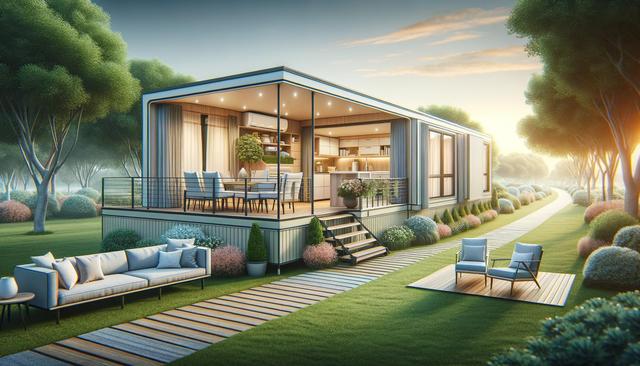
Mobile Homes for Seniors: A Comprehensive Guide to Affordable Living Solutions
Why Mobile Homes Appeal to Seniors
For many seniors, finding a living arrangement that offers both affordability and comfort becomes a priority during retirement. Mobile homes provide an attractive solution, combining low-maintenance living with cost-effective housing. Unlike traditional homes, mobile homes often come at a fraction of the price, which can be especially beneficial for those living on a fixed income. This allows seniors to preserve their savings while still enjoying a safe and comfortable space.
Another appealing factor is the simplicity and accessibility of mobile home layouts. Many are designed with single-level floor plans and fewer stairs, making them easier to navigate for individuals with mobility concerns. Features such as open living spaces, walk-in showers, and wide doorways can enhance the quality of daily life without requiring costly home modifications.
Additionally, mobile home communities that cater to seniors often promote a sense of neighborhood and connection. These communities typically offer shared amenities, social events, and a quieter environment tailored to older adults. For many, this provides not only a place to live, but a welcoming atmosphere to thrive in during their retirement years.
Affordability and Financial Benefits
One of the main advantages of mobile homes for seniors is their affordability. Purchasing a mobile home tends to be significantly less expensive than buying a traditional house or condominium. This can make a substantial difference for retirees who want to stretch their retirement savings while maintaining a good quality of life.
Key financial benefits include:
- Lower purchase prices compared to site-built homes
- Reduced property taxes and utility costs
- Potential eligibility for senior housing assistance programs
Moreover, for those who already own land or plan to move to a mobile home park, the ability to control housing costs is a notable perk. Affordable monthly lot rents and the option to downsize without sacrificing comfort are appealing factors for budget-conscious retirees. Financial flexibility is further enhanced by the reduced need for home repairs and maintenance, which are often more manageable in mobile homes.
Choosing the Right Mobile Home Community
Finding the right mobile home community is essential for achieving a satisfying senior living experience. Many communities are age-restricted, typically serving residents aged 55 and older, which helps foster a peaceful and respectful neighborhood atmosphere. These communities often provide amenities designed to support an active and social lifestyle.
When selecting a community, it’s important to consider the following factors:
- Location and proximity to healthcare, shopping, and family
- Community services such as lawn care, maintenance, and security
- Recreational facilities like clubhouses, walking paths, and fitness centers
- Rules and regulations that align with your lifestyle preferences
Touring communities, talking to current residents, and reviewing management policies can help seniors make informed decisions. A well-managed community can offer not just housing, but a supportive environment that contributes to overall well-being.
Design Features and Customization
Modern mobile homes for seniors have evolved significantly in terms of design and functionality. Today’s models offer a wide range of customizable features that can enhance comfort and convenience. Seniors can choose layouts that prioritize accessibility, such as open floor plans, wider hallways, and no-step entries.
Popular design options include:
- Energy-efficient windows and appliances
- Grab bars and safety rails in bathrooms
- Built-in storage solutions
- Outdoor decks or patios for relaxation
Customization allows residents to tailor their space to their specific needs, whether they require additional lighting, lower countertops, or special flooring. Mobile home manufacturers often offer packages that cater to seniors, making it easier to select features that align with aging-in-place principles. This flexibility supports long-term independence and comfort for older adults.
Considering Long-Term Living Needs
As with any housing choice, it’s important to think about the long-term implications of living in a mobile home. For seniors, this means considering future healthcare needs, mobility changes, and social support systems. Fortunately, many mobile home communities are located near essential services, including hospitals, clinics, and public transportation, which can support aging in place.
Planning ahead can include:
- Ensuring easy access to medical care and emergency services
- Exploring in-home care options if needed in the future
- Finding a community with a strong social support network
By selecting a mobile home that accommodates changing needs, seniors can enjoy peace of mind knowing their living situation supports not only their present lifestyle but also their future well-being. This proactive approach can reduce the stress of moving later in life and help maintain a consistent, comfortable living environment.
Conclusion: A Housing Option Worth Considering
For seniors seeking affordable, comfortable, and manageable living arrangements, mobile homes offer a practical solution. With thoughtful planning and the right community, mobile homes can provide a fulfilling and independent lifestyle during retirement. From financial savings to accessible design and social engagement, this housing option continues to gain popularity among older adults who value both comfort and value in their golden years.